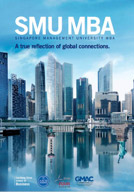
In the realm of folklore, the origins of the mythological unicorn can be traced back thousands of years. In the no less awe-inspiring world of entrepreneurship, a unicorn refers to a start-up valued at over a billion dollars, and this term was coined by a venture capitalist in 2013 to allude to the statistical rarity of such companies.
The Economist estimates that there are around 450 of such unicorns in the world. But faced with the economic impact of COVID-19, that figure may well dwindle. In May, SoftBank Group CEO Masayoshi Son said: "If I were to describe it, unicorns that had been climbing uphill hard are suddenly faced with a coronavirus valley — and the unicorns are falling into that valley."
In fact, signs of trouble had started to bubble up before the pandemic struck. In 2019, the likes of Uber and Slack had lacklustre IPOs, and WeWork had to cancel its IPO plans when investors showed little interest in the much-hyped workspace rental company. Capital flow from VC investors in the US and China were already starting to tighten up.
Now, with COVID-19 in the picture, “fissures in the capital-fuelled model that underwrote the boom are becoming exposed”, Nikkei Asia reports. In Southeast Asia, “where unicorns seemed destined to progress to decacorn [a company valued at over $10 billion] status, the coronavirus correction is a reality check for investors and a setback for the region's burgeoning startup ecosystem — at least until the pandemic is brought under control”.
“VC funding has been quite frothy for a long time, and it’s going to be more restricted going forward.” says Shantanu Bhattacharya, the Lee Kong Chian Professor of Operations Management, Deputy Dean (Programmes) and Academic Director for PhD in Business (General Management) at SMU’s Lee Kong Chian School of Business. “And that’s a good thing. We need to have some sanity.”
Exploring new business models
The business model of many unicorns can be generally described as using investment funds to scale up rapidly, often by offering customers steep discounts and attractive incentives to the necessary independent contractors, to achieve market domination.
Since this model meant they didn’t have to rely on fundraising from public markets, unicorns did not have to focus on turning a profit straightaway, as long as they could convince investors that hefty profits were right on the horizon.
In the current climate, Prof Bhattacharya believes that start-ups need to think about a profitable business model, growing at a more moderate scale, and providing true customer value. With VC funding growing harder to come by, they may also need to focus on alternative sources such as angel investors and seed funding from their immediate circle.
Even if the COVID-19 situation improves, he cautions, there are other storm clouds to consider. “The current US-China trade wars and tech protectionism will slow down innovation for everybody.” After all, the rise of Silicon Valley as a defining innovation engine was due to its ability to attract talent from all over the world and become a global centre of diverse ideas, he points out.
Without that embrace of diversity, it will be hard for not just Silicon Valley but also other aspiring tech hubs to thrive. Singapore certainly has ambitions in this area, but it faces the constraints of its small market.
“In a large market, a start-up’s ability to grow is much easier. Amazon had a target population of 330 million, and Alibaba had 1 billion. Redmart has 4 million. You can’t compare the resulting abilities to develop an ecosystem,” Prof Bhattacharya notes, adding that Southeast Asian countries will also need to further harmonise their laws before the region can unlock its full potential as a large market.
On the bright side
On the other hand, it’s not all doom and gloom. Prof Bhattacharya cites robotics, artificial intelligence, chip design, organic nutrition, and biotechnology as some areas with great potential for entrepreneurship.
Such businesses may tend towards B2B models and will not be as easy to hype up as the consumer-facing start-ups of the recent past, but they address urgent and emergent needs. “With more structure and robust business models, such start-ups will likely get valuations that are commensurate with their potential,” he believes.
And despite current headwinds, many remain optimistic about Southeast Asia’s prospects. In September 2020, venture capitalist Jenny Lee said: "Our belief is that the next billion Internet users will power the next phase of global growth. And these users will be found mainly in Southeast Asia and India.”
Meanwhile, also in September, homegrown online marketplace Carousell delivered a rare bit of good news with its announcement that it had received a new injection of funding and was now valued at around US$900 million.
“What’s significant about the deal isn’t just the valuation but also the behind-the-scenes secondary sale that saw seed and series A investors cash out a portion of their shares with sizable returns,” Tech In Asia reported. “Such exits are crucial in helping start-up ecosystems thrive, giving investors a financial incentive to continue backing fledgling companies.”
Fundamentally, perhaps what start-ups need to do is to abandon their unicorn dreams altogether and begin to emulate a different creature entirely. Business publication Marker proposes the much more prosaic camel as an example. In emerging markets, start-ups with less capital and ecosystem support are built to survive, it noted. They pursue sustainable growth, manage their costs, charge reasonable prices, and often diversify their product offerings and market expansion for the sake of financial prudence. In short, “unlike unicorns, camels are not imaginary creatures. They are real, and they are resilient”.
Speak to our Admissions Advisors
Singapore Management University
Lee Kong Chian School of Business
Graduate Programmes Office, Level 4
50 Stamford Road, Singapore 178899
Tel: +65 6828 0882
Join us at the upcoming events
Via Gerolamo Cardano, 1, 20124 Milano MI, Italy
1 Raffles Drive, Makati Avenue, 1224, Makati City
Bayerstraße 41, 80335 München, Germany
You may also be interested in
Executive Master of Business Administration (EMBA)
